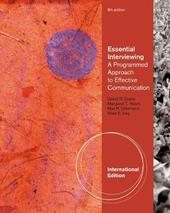
|
Essential Interviewing: A Programmed Approach to Effective Communication, International Edition
Paperback
Main Details
| Title |
Essential Interviewing: A Programmed Approach to Effective Communication, International Edition
|
| Authors and Contributors |
By (author) David Evans
|
|
By (author) Margaret T. Hearn
|
|
By (author) Max R. Uhlemann
|
|
By (author) Allen E. Ivey
|
| Physical Properties |
| Format:Paperback | | Pages:352 | | Dimensions(mm): Height 228,Width 185 |
|
| ISBN/Barcode |
9780840034724
|
| Classifications | Dewey:158.39 |
|---|
| Audience | | Further/Higher Education | | Professional & Vocational | |
|---|
| Edition |
8th edition
|
|
Publishing Details |
| Publisher |
Cengage Learning, Inc
|
| Imprint |
Broadman & Holman Publishers
|
| Publication Date |
27 May 2010 |
| Publication Country |
United States
|
Description
With an emphasis on the three major stages of interviewing: exploration, clarification and action, ESSENTIAL INTERVIEWING, International Edition offers the same programmed-learning model of interviewing that has successfully trained countless members of the helping professions for nearly 30 years. Based on Ivey's systematic method of interviewer, counselor, and therapist training, as well as Hearn's programmed-learning model, the text makes interview skills clear and specific. The authors give students the tools they need to conduct successful interviews with diverse clients in a variety of professional settings, including social work, counseling, nursing, personel work, and human services.
Author Biography
Allen E. Ivey is Distinguished University Professor (emeritus) at the University of Massachusetts, Amherst, and Courtesy Professor of Counseling at the University of South Florida, Tampa. He is president of Microtraining Associates, an educational publishing firm. A diplomate in counseling psychology, Dr. Ivey was honored as a Multicultural Elder at the National Multicultural Conference and Summit. He has written more than 40 books and 200 articles and chapters, translated into 25 languages. Dr. Ivey's undergraduate work was in psychology at Stanford University, followed by a Fulbright Grant to study social work at the University of Copenhagen, Denmark. His doctorate is from Harvard University. He is the originator of the Microskills approach, basic to this book. David R. Evans is professor emeritus at the University of Western Ontario, where he was a member of the Clinical Psychology Program for 30 years. He has been a consultant to numerous agencies, including hospitals, adolescent facilities, addictions facilities, and police services. He holds a Ph.D. in applied psychology from the University of Toronto. He has twice been a visiting scholar at Wolfson College, Cambridge. He is a past president of the Canadian Psychological Association and the Ontario Psychological Association. He also has been a member of the Council of Representatives of the American Psychological Association and a representative to the International Union of Psychological Science. He is the author of numerous books, chapters, journal articles, tests and papers. Margaret T. Hearn has spent over 30 years in the field of psychology. She holds a Ph.D. in counseling psychology from the University of Western Ontario. She has had extensive practical and research experience in clinical health psychology with children and adults at London Health Sciences Centre. Before retirement, her involvement was in the area of hospital management. Dr. Hearn has served as a teacher in the departments of psychology, psychiatry and pediatrics at the University of Western Ontario. She is the author of many books, chapters, articles and papers. In addition she has had extensive involvement with psychology at both a professional and regulatory level. Max R. Uhlemann is Professor of Counseling in the Department of Educational Psychology and Leadership Studies at the University of Victoria where he is Coordinator of the Counseling Graduate Program. He received his doctorate in Counseling Psychology from Colorado State University in 1974. He has been a counselor educator since 1970. He has been a licensed psychologist since 1976. His research and teaching interests include professional and paraprofessional counseling skill training, micro-counseling skill training, interpersonal process in the counseling dyad, multi-cultural issues in counseling, and ethics and legal education and practice. He has had a private practice in counseling and clinical psychology since 1988. The focus of this practice has been on working with individuals experiencing anxiety, depression, grief, loss, and traumatic stress. He was president of the Canadian University and College Counseling Association from 1984 to 1985. He is currently concluding his nine-year editorship of the CANADIAN JOURNAL OF COUNSELING. In 1996, he received the Professional Contribution Award from the Canadian Counseling Association. He has served on ethics committees for the Canadian University and College Counseling Association, College of Psychologists of British Columbia, and Canadian Counseling Association. He is a member of the Canadian Counseling Association, Canadian Psychological Association, College of Psychologists of British Columbia, Canadian Register of Health Service Providers in Psychology, and the Western Association of Counselor Education and Supervision.
Reviews1. Programming a Foundation for Learning. STAGE I: Listening and Exploration. 2. Attending Behavior. 3. Effective Questioning. 4. Reflecting Content. 5. Reflecting Feeling. 6. Integrating Your Exploration Skills. STAGE II: Clarification: Helping Clients to Clarify Their Experiences and Develop Goals. 7. Confronting. 8. Communicating Feeling and Immediacy. 9. Self-Disclosure. 10. Interpreting. STAGE III: Action: Helping Clients to Take Action. 11. Information Giving. 12. Structuring for Exploration, Clarification, and Action. 13. Enlisting Cooperation. STAGE IV: Effective Communication: Facilitating Clarification, Exploration, and Action. 14. Putting it All Together. Additional Resources. Index.
|